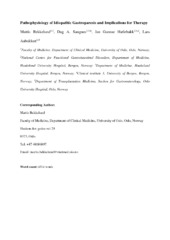| dc.contributor.author | Bekkelund, Mattis | en_US |
| dc.contributor.author | Sangnes, Dag André | en_US |
| dc.contributor.author | Hatlebakk, Jan Gunnar | en_US |
| dc.contributor.author | Aabakken, Lars | en_US |
| dc.date.accessioned | 2020-05-14T09:39:53Z | |
| dc.date.available | 2020-05-14T09:39:53Z | |
| dc.date.issued | 2019 | |
| dc.Published | Bekkelund M, Sangnes DA, Hatlebakk JG, Aabakken L. Pathophysiology of idiopathic gastroparesis and implications for therapy. Scandinavian Journal of Gastroenterology. 2019;54(1):8-17 | eng |
| dc.identifier.issn | 0036-5521 | |
| dc.identifier.issn | 1502-7708 | |
| dc.identifier.uri | https://hdl.handle.net/1956/22255 | |
| dc.description.abstract | Objectives: Idiopathic gastroparesis is a gastric motility disorder characterized by chronic upper gastrointestinal symptoms and delayed gastric emptying without an identifiable underlying condition. This review summarizes recent understanding of the pathophysiology and treatment of idiopathic gastroparesis. Materials and methods: Structured literature search in the PubMed, Embase and ClinicalTrials.gov databases. Results: Idiopathic gastroparesis involves several alterations in gastric motility and sensation, including delayed gastric emptying, altered myoelectrical activity, impaired fundic accommodation, visceral hypersensitivity and disturbances in antropyloroduodenal motility and coordination. Multiple cellular changes have been identified, including depletion of interstitial cells of Cajal (ICC) and enteric nerves, as well as stromal fibrosis. The underlying cause of these changes is not fully understood but may be an immune imbalance, including loss of anti-inflammatory heme-oxygenase-1 positive (HO-1) macrophages. There is currently no causal therapy for idiopathic gastroparesis. The treatment ladder consists of dietary measures, prokinetic and antiemetic medications, and varying surgical or endoscopic interventions, including promising pyloric therapies. There are ongoing trials with several novel medications, raising hopes for future treatment. Conclusions: Patients with idiopathic gastroparesis present several pathophysiological alterations in the stomach, where depletion of ICC is of special importance. Treatment is currently focused on alleviating symptoms through dietary adjustments, medication or surgical or endoscopic interventions. | en_US |
| dc.language.iso | eng | eng |
| dc.publisher | Taylor & Francis | eng |
| dc.title | Pathophysiology of idiopathic gastroparesis and implications for therapy | en_US |
| dc.type | Peer reviewed | |
| dc.type | Journal article | |
| dc.date.updated | 2020-01-20T08:14:44Z | |
| dc.description.version | acceptedVersion | en_US |
| dc.rights.holder | Copyright 2019 Taylor & Francis Group | |
| dc.identifier.doi | https://doi.org/10.1080/00365521.2018.1558280 | |
| dc.identifier.cristin | 1702908 | |
| dc.source.journal | Scandinavian Journal of Gastroenterology | |
